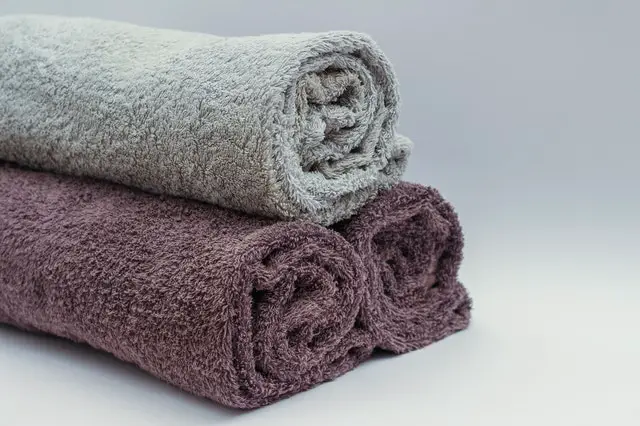Washing your towels look like an extremely straightforward task; pick it up, toss it into the washer, and then run a wash cycle. While that is actually true, there are some more factors to take into consideration if you want your towels to last longer, remain safe, remain hygienic and still retain their absorbency.
Such factors include:
- The temperature you should be washing your towels at
- The cleaning agent to use on your towels and those to avoid completely.
- The frequency of washing your towels
- And in this case, whether or not to wash your towels with other clothes.
As for whether or not your towels are safe companions for your clothes in the washer, here’s what to note.
Washing your towels together with clothes is not advisable primarily because towels have different wash settings from most cloths. Trying to figure out which fabric is compatible with a towel and which isn’t is a headache that can simply be avoided by washing towels with towels and clothes with clothes.
Aside the reason mentioned above, there are also other reasons that make towels the worst companions for fabrics in the washer. We’ll go through each one of them deliberately for your understanding.
Why you shouldn’t wash towels together with other clothes
Towels need a different degree of heat (not very high, but a bit higher than other types of clothes) and a longer period of time in the dryer
It’s not rocket science, if you place your towel alongside other, let’s say, more delicate material like nylon, you’re basically asking for trouble.
Nylon needs about 10 to 15 minutes in the dryer, and that’s it, if you take longer, it’ll start shrinking. A typical towel takes about 20 to 30 minutes to dry. This doesn’t only apply to nylon fabrics, but pretty much other materials that are more delicate than towels, I’m sure you get the idea.
Towels can destroy delicate materials
During washing, clothes rub against each other to produce the effect of washing, therefore this means that your towel will continuously rub against your expensive wool sweater for the entire duration of the wash. That can end up doing more harm than good since towels have rough surfaces and are heavy, and these can end up scratching, tearing, shrinking, wrap and squeezing delicate items. If emblements are there, it can even loosen them from the cloths.
Another reason you shouldn’t wash towels with clothes is that it really isn’t sanitary
You see, towels collect a lot of bacteria and dead skin cells every time we use it, not to talk about some of the places we use them on.
Apart from that, a lot of us prefer to hang out towels in our bathrooms, a recipe for bacterial infestation. This raises two concerns.
First of all, if you put it in the same machine as other clothes, there’s going to be a spread of bacteria. Instead of the bacteria to wash into the water, and then drain out of the system, it’ll wash into the water, and get absorbed by other clothes. And if you’re not opting for the dryer, then be sure you end up with a pretty good population on your clothes.
Here’s another way to look at things, you employ facial towels to get rid of dirt and oil on your face right? Would you want that same towel be washed with your jogging pants and jeans? because bacteria and dirt from them can also end up deposited on the surface of the towel during washing!
Secondly, towels typically require longer washing to rid it of bacteria. If you wash your towels with other types of clothes, you’ll end up washing them longer than required, and in the long run, they’ll look much older than their time, and the elastic ones will lose their elasticity
Towels produce lint, lots of them, especially cotton based towels.
If you wash a new towel and put it in the dryer, you’ll discover there’s a lot of lint in the dryer screen.
Yes I know the dryer screen is meant to collect them, but it’ll be a totally different story if you wash them with other types of clothes. Why? Because it’ll get easily attached to them, not to talk of the fact that some clothes, due to static build-up end up attracting loads of lint.
In case you haven’t experienced it, I’d love to tell you it’s a really tedious experience trying to remove a lot of lint stuck in your clothes.
The size of the towel could prevent your other clothes from getting clean:
Alright, just in case you didn’t know, the principle behind clothes getting clean is friction. Your clothes rub up against other clothes inside the machine and the friction gets rid of dirt.
However, if you put a towel (most especially a big one), during the cycle, the towel might end up forming a huge ball around other articles of clothing, thus preventing them from rubbing against each other, as well as getting clean.
If such a situation still persists in the drying stage, your clothes won’t be able to get dry, not even if your dryer has a damp censor.
Towels, especially cheap poor quality ones, are susceptible to bleeding. That is, with each wash, a portion of their colors fade into the water. If you wash such towels with other article of clothing, the color can bleed into the others, and if they go into the dryer like that, the color will end up drying and sticking harder to the clothes
What is the exception?
You could wash your towels with bed sheets that are compatible with them in terms of color and sturdiness. Bed sheets also take in a lot of bacteria and dead skin cells so they should be washed under a higher temperature than regular clothes. This means, temperature-wise, you can wash both items together.
Also, bed sheets and towels are both huge in size, so, as opposed to smaller clothes like shorts, cannot easily be wrapped, so they’ll both be able to wash easily.
However, you’ll have to ensure its not going to be a new towel. This is because, like I said earlier, new towels produce a lot of lint, as well as the cotton based ones.
In addition, avoid pairing towels with weighted blankets though and opt for a separate wash cycle for the later using this guide.
Can you dry towels with bed sheets?
Washing bed sheets with towels might be allowed, but drying them together is a completely different ball game. You see, when you wash new towels, they’ll likely produce lots of lint, however, when you dry towels, whether they’re new or old, they will produce lint.
These will end up getting stuck to the bed sheets, and if you think removing lint from your clothes is hard, try removing them from your bed sheets.
Also, despite the fact that they need more time in the washing machine due to the amount of microbes they hold, they won’t necessarily require the same amount of time and heat in the dryer. This is because they aren’t made of the same material (towels are much harder), so in the long run, your sheets could get damaged.
What are the best ways to wash and take care of your towels?
Washing
- As this article suggests, if it’s possible, wash towels with towels using only little detergent and moderately hot water, and make sure they’re compatible i.e. sort bleeding towels and wash them individually and separately — this would typically be the case if you have a new or fairly new colored towel, sort white towels and wash them together, and sort bleed free towels and wash them together.
- Don’t let them sit in your dryer too long. Remove them immediately, and give them a shake.
- Do not use fabric softeners on your towels. Fabric softeners will, in the long run, affect the absorbing power of your towel.
- Do not use too much detergent on your colored towels to prevent them from fading, In fact, do not use too much detergent on any type of towel because it may not rinse thoroughly and could come out full of suds, which irritates the skin and makes the towel stiff
- Do not put too many towels into your washing machine. Towels become much heavier when wet, so, imagine how heavy a bunch of them will be in the washer. Not only can it damage the machine, it can also reduce the spin-speed, thus preventing it from getting washed thoroughly.
First use
Ensure you wash your towel before using it for the very first time: manufacturers typically put some chemicals in towels to make them feel soft and appear more presentable when they’re in the shop. Washing your towel before first use helps prevent such chemicals from directly touching your skin, as some people may be allergic to them.
Daily use
You should always make sure you hang your towel out to dry between uses. This is because a damp towel builds up mildew very quickly.
How often should you wash your towels?
Towels should be washed after every 4 to 5 use.
Will my towel still be clean if I wash with cold water?
Washing in warm water is good for destroying microorganisms therefore it’s good for sanitizing your towel, alongside bleaching. As a result, it’s recommended for towels that have undergone heavy duty use or kept for long time without washing despite frequent use.
Warm water wash is advised to be done quite often, but most of the time, like the subsequent 2 to 3 washes that happen after a thorough cleaning, it’s best to use cold water. You shouldn’t wash in hot water at all because it will fade, shrink, and destroy your fabric much quicker.
How long do I use my towel before I discard it?
Experts recommend that you change your towel after two years because they’ll become defective, and harbor microbes if they become too old. However, if you’re unsure, these are the two signs to look out for.
- Your towel smells bad after every one or two uses, even though you washed it recently. This is as a result of bacteria sinking deeply into the fibers with time, which makes it quite difficult to get rid of with washing.
- Your towel is losing its absorbing power.
Read also: How often to dry clean suits?
Conclusion
To be on the safe side, do not wash your towels with other clothes, not even with sheets. The downsides to the practice are many and if you’re not careful, you could end up ruining your laundry. Also, stay away from fabric softeners and do not put too much detergent while washing.
Do these and your towels with last much longer.

